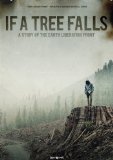| Reviews & Columns |
|
Reviews DVD TV on DVD Blu-ray 4K UHD International DVDs In Theaters Reviews by Studio Video Games Features Collector Series DVDs Easter Egg Database Interviews DVD Talk Radio Feature Articles Columns Anime Talk DVD Savant Horror DVDs The M.O.D. Squad Art House HD Talk Silent DVD
|
DVD Talk Forum |
|
|
| Resources |
|
DVD Price Search Customer Service #'s RCE Info Links |
|
Columns
|
|
|
If A Tree Falls: A Story of the Earth Liberation Front
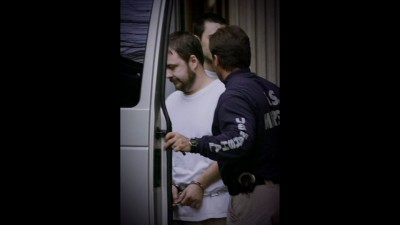
You might expect there to be some unavoidable element of agitprop in a documentary on the highly controversial Earth Liberation Front (ELF), a radical organization that garnered much attention and scrutiny in the late 1990s by vandalizing property--lumber mill offices, slaughterhouses, SUV dealerships, etc.--they considered emblematic of environmental irresponsibility. But documentarian Marshall Curry, the director of If A Tree Falls: A Story of the Earth Liberation Front, takes a refreshing, honestly curious approach that transforms what could easily have been a more simplistic film about "perpetrators" and "victims," "hippies" and "pigs," heroes and villains, into something rich, thoughtful, even profound. His investigation of a difficult, morally complicated subject has a real weight to it, encompassing incompatible yet equally good-faith points of view and letting them rub against each other, creating dramatic sparks that make the film both informative and provocative in the best, most useful sense of the term. It has all the valuable "agit" with very little of the dismissible "prop."
The project was serendipitously inspired, as Curry informs us in his voice-over narration, by a peripheral event in his own life: the sudden, shocking FBI arrest, on December 7, 2005, of a mild-mannered young man, Daniel McGowan, in the middle of his regular shift at a Brooklyn non-profit domestic violence agency managed by Curry's wife. McGowan was accused--and ultimately convicted--of actively participating in several ELF arson-actions, and is considered a "terrorist" by the United States government. It was the disconnect between the word "terrorist" and this apparently modest, socially-conscious acquaintance of his that led Curry to initiate his documentary project. He and his filmmaking partner, Sam Cullman, were given access to McGowan and his family as the accused paced his sister's apartment while under house arrest, waiting to be tried for his crimes, with the possibility of terrorist-level punishment hovering over his already nerve-wracking situation. From this present-moment vantage point, Curry and Cullman take us back into Daniel's incredibly ordinary personal history, the burgeoning political awareness, activism, and radicalization of his young adulthood, and his deepening involvement with the ELF, whose ideologies, origins, and evolution are explained through interviews with those who were present in and around the Eugene, Oregon-based organization at the height of its activity. (McGowan had relocated from his hometown of Queens to Eugene, a large-ish college town and longtime hippie mecca, to pursue his environmental activism.) Intercut with McGowan's story are footage of what the lumber industry, wild-horse-slaughtering facilities, and urban gentrifiers actually do in the course of business (it isn't pretty) and brutally repressed protests ranging from local Eugene tree-saving actions to the notorious 1999 "Battle in Seattle" WTO protests (even less pretty); factual recountings of the property crimes for which the ELF was responsible; and interviews with business owners and law enforcement officials who were, respectively, the targets and prosecutors of the ELF's violations of the law.
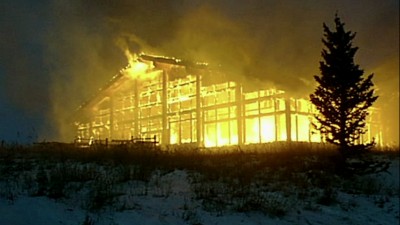
If you have ever doubted that the personal and the political overlap in a way that makes them impossible to sharply distinguish, you may well be convinced otherwise by the people you meet and what you see in If A Tree Falls. The fact that McGowan's acute (if often naive or inarticulate) sense of morality is what led him both into and out of the ELF; the always-honored commitment of the ELF to target property, never human life; the real bewilderment of the mill owners and law enforcement, many of whom consider themselves environmentalists, too; the personal histories and idealistic camaraderie of ELF members, which intersect with and feed into their activism; the tendency of radical-revolutionary organizations to degenerate into personal rivalries and internecine squabbles; the heartfelt second thoughts and self-doubt of those convicted of the arsons; the recklessness and irresponsible aggression of some protesters; the potential for police violence committed against non-violent protesters to further radicalize those committed to a cause--none of these factors are given short shrift, and one after the other, they deepen our understanding of the situation at the same time they render it more and more difficult to judge in any clear-cut way. The film faces us with some seriously challenging questions--questions that obviously gnaw at the filmmakers themselves--about what concepts like law, order, terrorism, and justice really mean. A montage of stills depicts buildings engulfed in flames, people wandering through their destroyed offices looking aghast, and we wonder how effective a tactic for change or progress this could possibly be. Another sequence comprises footage of disastrous oil spills and barren hills littered with stumps and fallen trees, and we can feel the urgency of making these things stop, now. It is difficult to see shop owners and citizens trying in vain, during the WTO protests, to protect what has been worked hard for against the destruction of protesters; it is horrendous to watch police officers swab pepper spray into the eyes of protesters who have chained themselves down and refuse to move, passively obstructing processes they believe to be morally inadmissible.
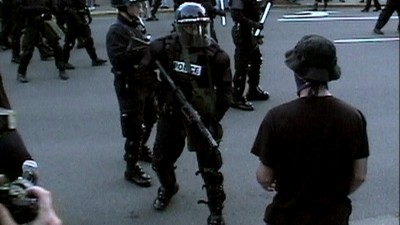
And we are shown the consequences of legally treating politically motivated, life-respecting arsonists as "terrorists." If the film centers around Daniel McGowan, it is not because he is a hero or martyr any more than he would consider himself to be a "terrorist," but because he embodies the uneasy coexistence of conviction and doubt that Curry and Cullman are concerned with. He is a former criminal, still committed to the environmental cause but not at all certain that the actions he took while with the ELF were the right ones. He was, like many of us, frustrated, motivated to change unjust and destructive practices, but unsure about what effect he could have or what real action he could take to address an institutionalized, seemingly unstoppable injustice. The McGowan we meet in the film, doubting the rightness and effectiveness of the ELF's tactics and repelled by the degeneration of Eugene's radical activist community into a petty pecking order, has left underground activism behind and moved on with his life, rejoined his family in New York, and found a job that is in line with his principles but that few would question benefits society. Now, after his crimes have caught up with him, not only his own life but that of his family is thrown into turmoil. His sister, Lisa (critical and supportive of her brother in equal measures, and one of the film's most charismatic personalities), has given up almost everything she owns to pay his exponentially mounting legal fees. His wife, Jennifer Synan, whom he married while on house arrest but before being convicted and sent away, will go for years without any physical contact whatsoever because, as a "terrorist," Daniel is locked away in a "Communication Management Unit," which means that until he is released, this husband and wife will be allowed to see each other only through a glass partition. There are no exceptions to the strictness of policy when it comes to "terrorists"; we later find that Daniel was allowed only his regulation monthly 15-minute phone call by way of saying goodbye to his dying mother.

As involving as McGowan, his cause, and his questionable actions and their consequences are, the film goes well beyond being a fascinating and relevant inquiry into the ELF and what being an activist could or should mean, pulling back to look at the bigger picture, the issues McGowan's plight raises that are of direct concern to all of us, quite apart from questions of social or environmental philosophy. Following in the footsteps of Michael Winterbottom's Road to Guantanamo and Thomas McCarthy's The Visitor, the film raises the thorny and disturbing problem of what we are willing to let our legal and judicial systems become when the word "terrorism" is thrown around so indiscriminately and manipulatively--when it is, in fact, spun very often for political purposes--and when nobody has to explain why this or that extraordinary punishment is meted out to this or that specific "terrorist." How, exactly, do we define terrorism? Destruction of property? The taking of lives? Who has really earned the unequivocal and far-reaching condemnation of being judged a terrorist, and how? Who has the power to decisively, authoritatively answer these questions, inflicting harsh consequences without ever being obliged to account for their judgment calls? If A Tree Falls adeptly brings the urgency of such troubling questions to the fore, but it is not presumptuous enough to offer answers, and we are left to ponder them for ourselves.
Paradoxically, it is the film's patchwork of different types of visuals--animated graphics, present-day DV footage and interviews, TV news clips, video shot by police, activists, and supporters as events unfolded--that make it, when tied together with Curry's plainly spoken, well-written narration, such a well-integrated, whole piece of work; it is a style simultaneously necessary to avoiding gaps in the film's storytelling and exemplary of the filmmakers' philosophical commitment to offering multiple points of view. However, if it is part of the film's express purpose not to create a harmonious synthesis that pretends to resolve any moral conundrums, neither is If A Tree Falls cacophonous or muddled in its approach. Curry and Cullman are only concerned with attempting to understand the issues as deeply as possible while lucidly posing the serious questions that understanding raises, not with finding immediate answers, but it is well within their skilled reach to gather and structure their cinematic elements in a way that does have the power to clarify, which makes If A Tree Falls, for all its unwillingness to reduce any of its grays to black or white, an incredibly sharp, lean, focused, and compelling experience.
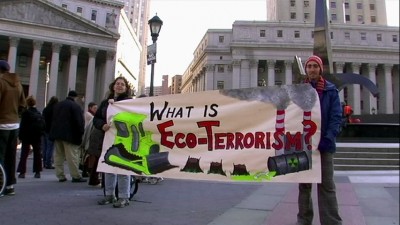
THE DVD:
The images in If A Tree Falls, which is presented in a widescreen/anamorphic transfer at an aspect ratio of 1.78:1, come from a wide variety of different videotape sources, from the latest, pretty-looking DV to decade-old amateur camcorder footage and even TV news segments that appear to be taken from VHS recordings. But everything looks just as it should; this mix-and-match of disparate visual qualities is innate to the film's intentionally rough, uneven visual design, and all possible close attention has been paid to ensuring that the film can achieve its aesthetic and intellectual goals on our home screens.
Sound:The disc offers two soundtrack options, Dolby Digital 2.0 stereo and Dolby Digital 5.1 surround. Both are top notch, with all voices and music crystal clear, full, and well-balanced (particularly for the surround mode), with absolutely no distortion or other sonic flaws. The 5.1 soundtrack, in particular, showcases the film's sometimes surprisingly multidimensional sound design.
Extras:A feature-length commentary with Curry and Cullman reveals them to be, as one might expect from watching the film, very down-to-earth, concerned people, and deep, critical thinkers. Their affection for all of their subjects is evident from their commentary; more important, they share many insights about the often dull, exhausting footwork of making such a film and the challenges of structuring a sprawling spider's web of a story into 90 minutes while retaining the impeccable honesty, integrity, and evenhandedness to which they are committed. We can only be grateful that they and their team had the fortitude and persistence to carry out what was, to hear them tell it, an often very trying, skin-of-their-teeth effort.
Several interesting deleted scenes further demonstrate how ruthless Cullman and Cowan had to be in preventing the story they were telling from overreaching its grasp; these scenes are fascinating not least because they introduce further situations and raise additional questions that the film would have then had to stop in its tracks to acknowledge and answer, veering off into other stories that, while equally intriguing, are not the film's. A short batch of extended interviews with some of the talking heads from the feature let us get to know just a little better some people--McGowan's sister and wife, the case prosecutors, former ELF-ers like Suzanne Savoie, who has to live with turning in McGowan as part of her reduced-sentence plea-bargain--that the film has already done a good job of letting us get close to. Like the more detailed commentary, which addresses many of the same questions, a Q&A with Curry and Cullman after an Ashland, Oregon screening of the film demonstrates once again the filmmaker's respectfulness and conscientiousness (not that their work wasn't already sufficient evidence).
Finally, there is a trailer gallery containing the preview for If A Tree Falls and those for other Oscillopse releases (Bananas!, No Impact Man) of similar thematic interest.
It should also be mentioned that Oscilloscope has done its usual exquisite job of packaging on If A Tree Falls, whose beautifully and uniquely designed cardboard sleeve and fold-out case can be considered "extras" in their own right.
FINAL THOUGHTS:If A Tree Falls director Marshall Curry has not only made an eminently watchable, entertaining, enlightening, provocative, highly intelligent and sensitive film; he has also, in his approach, set what could be a useful example for any of the "sides"--the Earth Liberation Front, mainstream environmentalists, logging businesspeople, law enforcement--he is documenting and trying to understand. We can see, in the images Curry shows us with such a rare commitment to responsibility and clarity, the mutually dehumanizing ill will, presumptuousness, and disrespect on the parts of both those who feel they are rightly fighting for a worthy cause and those who see their strategies as needlessly destructive and ill-conceived, as well as the regret with which many look back on the rushes to judgment and losses of control that such an attitude may have led them to. What the film has to relate is not one side's superiority to or victory over the other (such a victory is not really possible on its terms), but the very negative, long-lived consequences of failing to adequately consider the actions we take, no matter how right we are. That impassioned neglect of the "other side"'s thoughts, feelings, and humanity is a blind spot that Curry is never guilty of, but that is not to say his film is not impassioned; it just proves that you can ask difficult questions, evoke strongly held convictions, and explore complex issues that make emotions run high without robbing those with whom you might disagree (and there is plenty to disagree with in some of the beliefs and tactics of almost any individual in the film) of the respect and dignity that is everyone's right. Highly Recommended.
|
| Popular Reviews |
| Sponsored Links |
|
|
| Sponsored Links |
|
|
| Release List | Reviews | Shop | Newsletter | Forum | DVD Giveaways | Blu-Ray | Advertise |
|
Copyright 2024 DVDTalk.com All Rights Reserved. Legal Info, Privacy Policy, Terms of Use,
Manage Preferences,
Your Privacy Choices | |||||||









